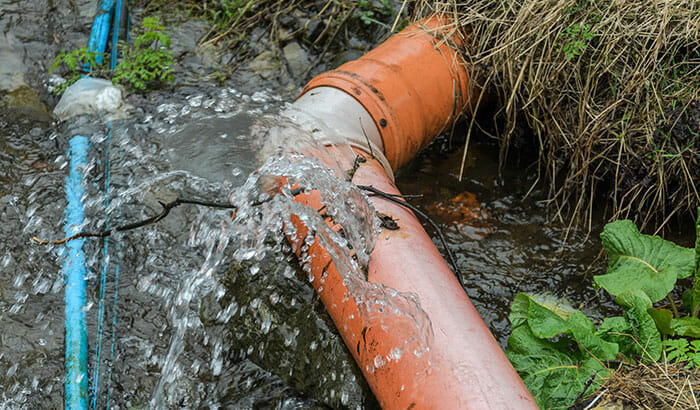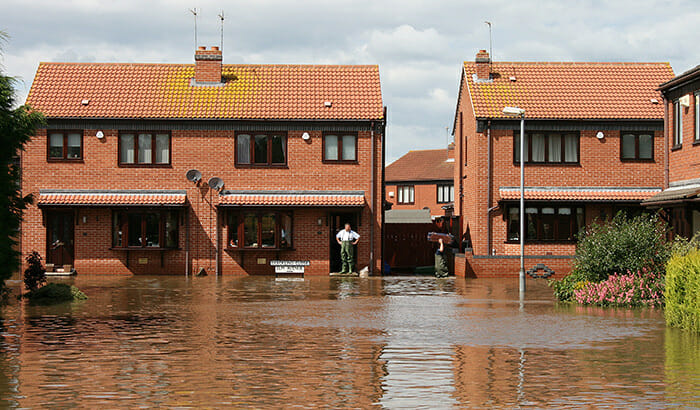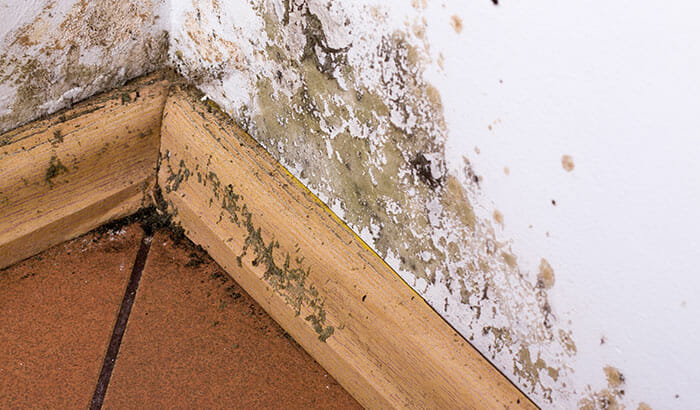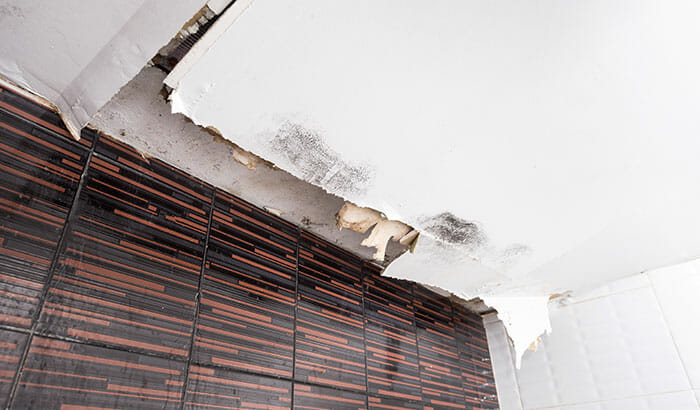Behind house fires, house floods have the greatest potential for short and long-term damage to your home.
When an unprecedented accident occurs, leaving your basement flooded, you may feel like you are literally and figuratively up to your knees in problems!
As overwhelming as flooding can be, cleaning up from a house flood is a pretty straightforward process. Most of the hard work will likely be over within 24 hours from when the food started.
Here are some things you can do to prepare for and recover from a house flood resulting from a burst pipe.
Preventing House Flooding
As the great Benjamin Franklin once said, an ounce of prevention is worth a pound of cure.
Most causes of home flooding are preventable. These proactive methods don’t take much energy or effort either. Most of the preventative measures for preventing home flooding boil down to ensuring water doesn’t freeze in your pipes and also making sure your pipes are well maintained.
Here are some proactive ways you can avoid flooding from a burst pipe.
Prepare Your Home for Freezing Temperatures
Remember, water can freeze in pipes during the winter, which can cause them to burst. This can be prevented by ensuring that your pipes are adequately insulated and that the temperature in your home is kept well above freezing.
If you’re going to be away from home for an extended period of time, it’s also a good idea to keep your heat on low to prevent your pipes from freezing.
Maintain Your Hose Bibs
Hose bibs, also known as spigots or outdoor faucets, are particularly prone to cause water leaks in the home. Thousands of homeowners experience burst pipes as their hose bibs begin to thaw in the early spring. Be proactive about preparing your home!
To prevent leaks from occurring, homeowners should take precautions to winterize their homes before the weather begins to turn cold. This includes turning off the water supply to the hose bibs, removing any garden hoses, and covering the bibs with insulating covers.
If you have a leaky hose bib, consider replacing it before the winter sets in. If you don’t, you put your home at risk of spring flooding.
Keep Your Plumbing Updated
Your pipes become less secure as your plumbing system ages. However robust the elaborate lines of water going through your home are when they are installed, everything ages.
Decades of running water through your pipes can wear out pipe connections opening opportunities for water to lose containment. Be sure to keep your plumbing system up-to-date by repiping your home if your home is 50 years old or more.
How To Recover From a Flooded Basement
When a house floods due to a burst pipe, be it a hose bib leak or similar problem, it is time to act.
When it comes to water damage, the first 24-48 hours after the initial flood are the most critical. During that time, you should clear out all the damaged or afflicted items and ensure the floor is drying.
Failing to clean your home immediately following a house flood from a burst pipe can lead to problems with mold later.
Stop the Water
One of the first things you should do when you have a house flood from a burst pipe is to stop the flow of water. This can be done by turning off the main water supply to your home, which is usually located near the water meter. If you’re unable to locate the main shut-off valve, you can call a plumber to help.
Remove Standing Water and Damaged Materials
To recover from a flooded basement, the first step is to remove as much water as possible. This can be done by using a sump pump, wet/dry vacuums, or other tools designed for water removal.
You will also need to remove any damaged materials, including furniture, carpet, and drywall. Because water is very good at seeping through layers, you will need to expose your subfloor and dry it out so mold doesn’t begin growing under your carpet or hardwood floor.
Dry and Dehumidify
Once the water has been removed, it’s essential to dry out the area as quickly as possible to prevent mold growth. This can be done by using dehumidifiers and fans.
Constant air circulation and dehumidification work well to pull moisture out of the air. The osmotic properties of water will then draw the moisture out of your damp subfloor and into the drying air.
Inspect for Damage
After the water has been removed and the area has dried out, it’s crucial to inspect the area for damage. This includes looking for any structural damage to the walls and floors and any damage to electrical systems or appliances.
If you suspect that there is any damage, call in a professional to assess the situation and make repairs as needed.
Disinfect Flooded Area
Another important step in recovering from a flooded basement is to disinfect the area. This is important to prevent the growth of mold and bacteria. This can be done by using a solution of water and bleach or by hiring a professional cleaning service.
Disinfecting your home is imperative if any organic waste is in the flood water. This waste can be from any broken or flooded sewage lines. Wastewater carries dangerous microorganisms that can cause severe sickness. Be sure to guard yourself against them through thorough disinfection.
Make Repairs
After the area has been cleaned, it’s critical to consider making any necessary repairs or improvements to prevent future floods. This may include installing a backwater valve, repairing any leaks or cracks in the foundation, replacing leaking and broken hose bibs, and insulating any exposed pipes.
For those who have valuable personal belonging or important documents damaged by the flood, consider making copies or taking photographs for insurance purposes before discarding or cleaning the items.
Depending on the amount of damage done, it may be necessary to bring in a professional to assess the situation and advise on the best course of action.
Structural engineers and water damage restoration specialists can help you understand the extent of the damage and help you develop a plan to get your home back to normal as soon as possible.
Bull Matrix Can Bail You Out!
It’s important to note that water damage is a severe thing, whether it is caused by a leaking hose bib or a backed-up sewer. Water damage can cause extensive structural damage to your home, as well as lead to the growth of mold and bacteria.
The damage caused by water can be both costly and time-consuming to repair, so it’s important to take action as quickly as possible.
If you ever find yourself in a situation where you have a house flood from a burst pipe or any other kind of water damage, it’s important to know that you’re not alone. Bull Matrix Restoration is a trusted company you can call on for assistance.
Our expert team of professionals can help with everything from water removal to mold remediation and rebuilding. Don’t hesitate to reach out for help; it’s better to address the issue as soon as possible to prevent further damage.





